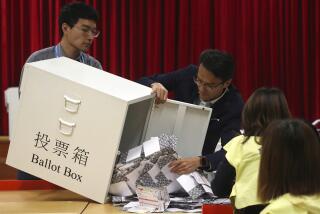China Roughs Up Hong Kong : Beijing vents its anger over reforms as the British colony nears its historic change in 1997
Uncertainty clouds the future in Hong Kong as Beijing flexes its muscle on a number of issues affecting the British colony after its scheduled return to China in 1997. Still bristling at the electoral reforms introduced by Hong Kong’s last British governor, Chris Patten, China is making some worrisome changes that undermine the 1984 Sino-British agreement to allow Hong Kong to preserve its economic and social way of life for 50 years under a Chinese policy of “one country, two systems.”
First, Beijing has vowed to replace the Hong Kong Legislature, which will be elected next year under new British reforms, with lawmakers of its own choosing. The appointed legislature would serve for an interim period.
Beijing has also indicated that it will reject any substantial changes in laws passed by the legitimately elected Hong Kong Legislature between now and 1997.
New questions about what legal system might or might not be in place in Hong Kong under the Chinese are unsettling. The Sino-British agreement provides for the creation of a Court of Final Appeal as the territory’s supreme legal authority after 1997. At issue now are the representation and composition of that court. Controversy over that does not inspire confidence.
There are concerns about existing Draconian laws that restrict press freedom, especially in light of Beijing’s recent imprisonment of two journalists. In a speech to the National Press Club in Washington last month, Daisy Li Yuet-wah, vice chairman of the Hong Kong Journalists Assn., described press freedom as an “endangered species.” She cited increasing pressures for journalists to change to fit into a Chinese system.
Also troubling are recent incidents of self-censorship in publishing and broadcasting. TVB, a leading station in Hong Kong, had the broadcasting rights but refused to air two BBC documentaries, one on Mao Tse-tung and another on Chinese labor camps, to avoid embarrassing China. Some Hong Kong publishers are refusing to print schoolbooks that would be used after 1997 without assurances that the books, designed to accompany a new 1996 curriculum, will not be rejected by the Chinese government. The publishers believe chances are slim that the Chinese will accept any textbook written under the British administration.
Such developments do not portend a smooth transition from British rule to Chinese sovereignty. They send all the wrong signals to those within and outside Hong Kong. But Beijing still has the opportunity to restore faith in its “one country, two systems” policy. It needs to work with and for the people of Hong Kong rather than venting its anger at Gov. Patten and his reforms.
More to Read
Sign up for Essential California
The most important California stories and recommendations in your inbox every morning.
You may occasionally receive promotional content from the Los Angeles Times.










